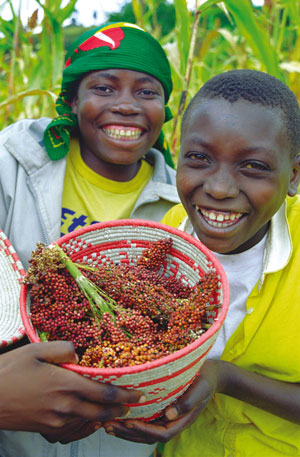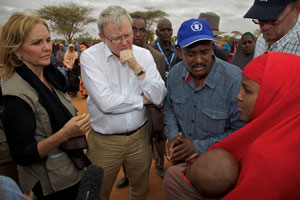Anti-Poverty Week, 16–22 October
Anti-Poverty Week was established in Australia as an expansion of the UN's annual international Anti-Poverty Day on October 17.
Anti-Poverty Week aims to:
- increase public understanding of the causes and consequences of poverty and hardship around the world and in Australia
- encourage research, discussion and action to address these problems, including action by individuals, communities, organisations and governments.
Foreign Minister Kevin Rudd and East Timorese President Jose Ramos-Horta visited a farm in Mailana, East Timor participating in AusAID's Seeds of Life program.
Jessica Watson discusses her visit to Laos as a representative of the World Food Programme, who are working with AusAID to provide meals to schools.
Every year around 925 million people do not have enough food to eat.
World Food Day [external website] heightens public awareness of the problem of hunger in the world and strengthens international and national solidarity in the struggle against hunger, malnutrition and poverty.
Price swings represent a major threat to food security. Hardest-hit are the poor. According to the World Bank, in 2010–2011 rising food costs pushed nearly 70 million people into extreme poverty.
Food prices–from crisis to stability has been chosen as this year's World Food Day theme to shed some light on this trend and what can be done to reduce its impact on the most vulnerable.
Food and Agriculture Organization YouTube video: From crisis to stability–World Food Day 2011 [external website]
What is Australia doing?
Australia is supporting global efforts to improve food security by boosting long-term agricultural productivity, market development and building resilience, while meeting the immediate needs of vulnerable people when and where humanitarian crises occur.
Horn of Africa famine
The most severe impacts of food insecurity can be seen in the current crisis in the Horn of Africa. More than 13 million people in Djibouti, Ethiopia, Kenya and Somalia are in urgent need of food and humanitarian aid because of consecutive droughts, following two poor rain seasons.
The Australian Government has responded rapidly to the crisis with funding for urgently needed food rations, health support and shelter to help the most vulnerable people affected by the crisis.
Australia is the third largest country donor to the crisis with a total contribution of $128 million including $98 million in humanitarian assistance and $30 million for the region's long-term food security.
Australian Government assistance to the Horn of Africa crisis
Dollar for Dollar
On 5 October 2011 Minister Rudd launched the Australian Government's Dollar for Dollar initiative, matching each dollar donated by the public to AusAID-accredited non-government organisations working in the Horn of Africa. Australians are renowned for their generosity and this initiative will make the public's contributions go even further.
Australia's support to United Nations World Food Programme (WFP)
WFP [external website] is the world's largest humanitarian agency fighting hunger worldwide and is a key humanitarian partner for the Australian aid program. Australia is currently WFP's fifth largest donor.
In 2009 Australia signed a $180 million, four year Strategic Partnership Agreement with WFP, which incorporates core funding and support for WFP's school feeding programs.
In addition, Australia provided funding to assist WFP in recent humanitarian emergencies including:
- $57 million in response to the Horn of Africa crisis where WFP is extending operations to feed more than 11.5 million drought affected people in the Horn of Africa; and
- More than $80 million in response to the floods in Pakistan in 2010 and 2011 for emergency food relief.
School meals in Laos
Record-breaking sailor and Young Australian of the Year Jessica Watson has voiced her support for the AusAID-funded WFP School Meals Programme in Laos, in her role as a Youth Representative for WFP.
In partnership with the Lao Government, the WFP-assisted School Meals Programme is implemented in 1,500 schools and supports close to 400,000 people, including more than 150,000 pre-primary and primary school children and their families.
Play: Freerice
Test your vocabulary by playing Freerice. Ten grains of rice will be donated on your behalf to the World Food Programme for each answer you get right!
Poor rural children in Laos have little encouragement to complete even primary education. Girls in particular are often expected to bear a heavy workload at home, care for younger siblings and work in the fields. The cost of sending children to school, particularly girls, is high for poor households and education is given low priority. School meals have been shown to be very effective in increasing enrolment and attendance rates in assisted schools, and more children come to school every year in Laos thanks to the program.
Jessica Watson supports school meals program in Laos
Long-term solutions
Australia is investing in long-term solutions to food insecurity. In May 2009, The Australian Government announced a four-year, $464 million global food security initiative. The initiative aims to assist countries in Asia, Pacific and Africa affected by the global food crisis. The initiative focuses on:
- lifting agricultural productivity (through research)
- improving rural livelihoods.
More information
Global Agriculture and Food Security Program: Australia is supporting this World Bank managed program to provide grants to low-income countries to boost agricultural productivity, help poor rural people increase their incomes and improve long-term food security and nutrition.
Focus on Food: More stories about Australia's efforts to make people in developing countries more food secure.
[external websites]
WFP campaign: Feed a child, feed a dream
WFP YouTube: World hunger–A Billion for a Billion
Australian Centre for International Agricultural Research (ACIAR)
The Food and Agriculture Organization of the United Nations
Media release: Australian agricultural expertise helping feed developing countries


